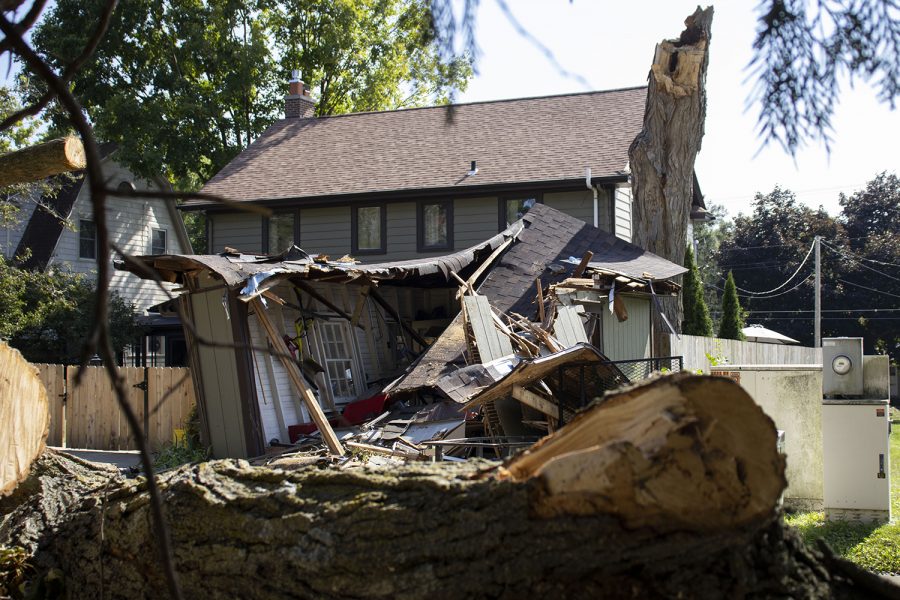Opinion | The aftermath of derecho shows holes in media landscape
Two weeks since the wind storm swept through the Midwest, the government’s response is still lacking. And it’s partially the media’s fault.
A damaged shed is seen on Friday, Aug. 14, 2020 on Court St. in Iowa City. After the derecho storm that swept through Iowa on Monday afternoon, Iowa City and neighboring communities are still reeling from wind damage and power outages.
August 25, 2020
“whY Isn’t thE mEdIA cOvErIng thIs?”
It’s something of a joke on Journalist Twitter. There are countless posts asserting a lack of news coverage about various atrocities such as police brutality, a fascist protest, or something COVID-19-related. The punchline is that the source of such outrageous information often comes from local news outlets and reporters.
This column isn’t about that particular reply-guy-ism — there’s clearly underreporting of all sorts of injustice — but it is about how the media isn’t covering this: the Aug. 10 derecho.
That was a long intro, but you probably know what happened. Massive storm. Hurricane-level winds. Many in east central Iowa went without electricity for days (and some are still in the dark). Thousands displaced. Billions in damage.
One of the biggest natural disasters in Iowa history seems like the sort of thing that gets wall-to-wall coverage, right? Not quite. While Iowa’s reporters leapt into action, many of our colleagues on the coasts didn’t stop scrolling.
And it’s not as if the national media has an aversion to weather events. There are twin hurricanes in the Gulf of Mexico getting plenty of press right now. Blizzards always get their spot in the rail. And if a storm is heading for the Washington-to-Boston corridor, that evidently becomes the only thing that’s ever happened.
But Iowans are homeless and hungry within a matter of hours? Here’s the 39th think-piece on cancel culture. The ongoing crisis in Iowa might not have counted as breaking news, but if half a million New Yorkers lost power for days on end, we’d all hear about it in the Heartland. (They made an entire Friends episode about that.)
There’s more to this problem than just a lack of tweets from The Coastal Elites. The situation on the ground in Cedar Rapids and the surrounding area is made worse by the lack of national attention.
Iowa Gov. Kim Reynolds requested about $4 billion in federal disaster aid on Aug. 16. That slow response was met with an even slower reaction from Washington. President Trump was quick to lie about “fully” granting the request, though most of the funds are still under review over a week later.
Of course, this is nothing new from Republican administrations. From Hurricanes Katrina to Maria, the GOP shows little interest in helping those suffering for simply living in the path of a storm. In a macabre way, I thought maybe because so much of the Hawkeye State is Trump Country, that it would be different here for than New Orleans or Puerto Rico. But nope, while Reynolds claimed the president “had our back” at the Republican National Convention last night, we’re still getting screwed.
So, the government’s failed derecho response isn’t entirely on the media. But as national news teams trickle into our borders to report on the devastating aftermath, we have to acknowledge that they weren’t here when we first needed them.
This leaves us with each other. In some ways, it’s the libertarian ideal to which so many claim to aspire. The government isn’t swooping down to the rescue. The news doesn’t care. We’re all we got.
We’re left with the heroes we already had, our local communities bonding together to respond to our collective crisis. Volunteers, public-works crews, and local journos are on the front lines of the months-long rebuilding process, and they deserve our support and gratitude.
The “media” might not be covering this, but we’re still here.
Columns reflect the opinions of the authors and are not necessarily those of the Editorial Board, The Daily Iowan, or other organizations in which the author may be involved.



